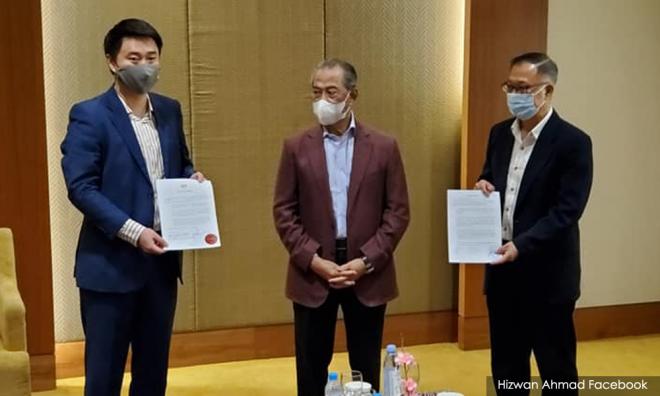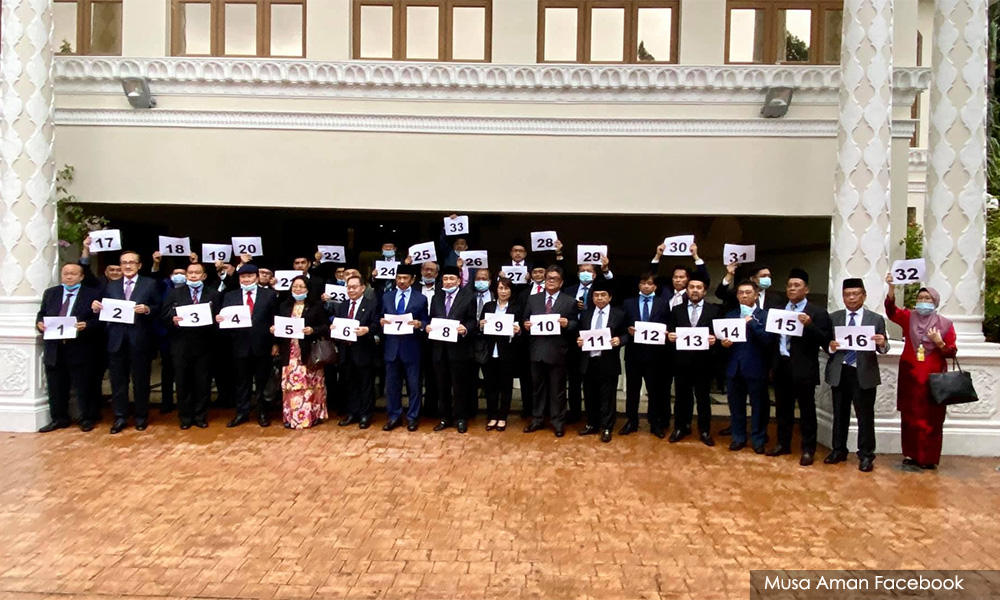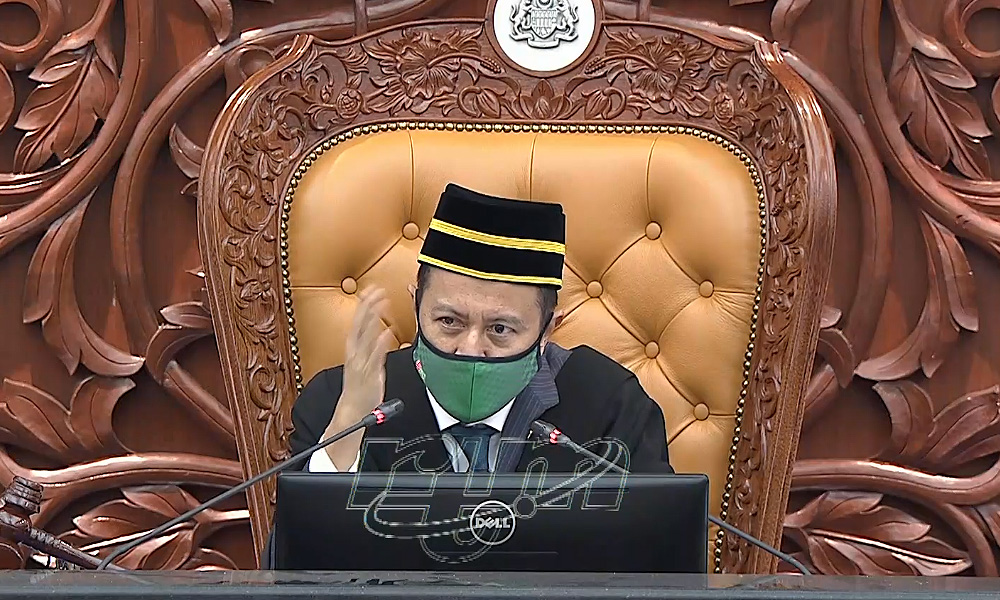
Can two party-hoppers save Muhyiddin after June 29?
by Wong Chin Huat
by Wong Chin Huat
The hopping of Tebrau MP Steven Choong and Julau MP Larry Sng looks like Muhyiddin Yassin’s own present for the first anniversary of his government.
That just technically restores Muhyiddin’s majority to 112* as before yesterday he had only 110 votes in the House, after the official exit of Machang MP Ahmad Jazlan and Padang Rengas MP Nazri Aziz on Jan 9 and 11.
That just technically restores Muhyiddin’s majority to 112* as before yesterday he had only 110 votes in the House, after the official exit of Machang MP Ahmad Jazlan and Padang Rengas MP Nazri Aziz on Jan 9 and 11.
[Editor's note: This figure includes Gua Musang MP Tengku Razaleigh Hamzah]
However, the main threat to Muhyiddin’s survival is not Pakatan Harapan, (whose number of MPs drops from 91 to 89) or Harapan Plus (from 108 to 106). His main threat is Umno's remaining 36 seats counted as his fragile majority.
Muhyiddin can work to get more hoppers from Harapan, Warisan or PSB, but how many can he get to fill the void if Umno pulls out?
Muhyiddin’s survival and Anwar’s failure
Despite his shaky majority since last March 1, Muhyiddin has survived for one simple reason.
There has only been a negative majority against him, not a positive majority for his successor. Dr Mahathir Mohamad, Anwar Ibrahim and Shafie Apdal have all failed to gather a positive majority of 112 to force Muhyiddin to resign or seek an election.
Anwar, whose repeated claims of having the number, simply cannot do a Musa Aman, who lined up the 33 assemblypersons (out of the total of 65) in his camp holding a number card like farm animals in an auction on last 30 July.
Muhyiddin can work to get more hoppers from Harapan, Warisan or PSB, but how many can he get to fill the void if Umno pulls out?
Muhyiddin’s survival and Anwar’s failure
Despite his shaky majority since last March 1, Muhyiddin has survived for one simple reason.
There has only been a negative majority against him, not a positive majority for his successor. Dr Mahathir Mohamad, Anwar Ibrahim and Shafie Apdal have all failed to gather a positive majority of 112 to force Muhyiddin to resign or seek an election.
Anwar, whose repeated claims of having the number, simply cannot do a Musa Aman, who lined up the 33 assemblypersons (out of the total of 65) in his camp holding a number card like farm animals in an auction on last 30 July.

Musa made it unequivocal that he commanded a new positive majority, leaving the then chief minister Shafie no choice but to seek resolution. Friendly governor Juhar Mahiruddin also had no choice but to consent to it.
In institutional term, Musa demonstrated his ability to pass a “constructive vote of no-confidence”, a majority that both ousts the incumbent and installs a replacement.
Anwar could only claim to have the number of MPs based on their statutory declarations in support of him, but could not reveal the names, because he only had a negative majority against Muhyiddin, not a positive majority for himself.
That anti-Muhyiddin negative majority might turn into a pro-Anwar positive majority, but only if the former could become a fait accompli, which might first need a royal blessing that Anwar simply could not get.
Vote of no confidence - simple v constructive
“Constructive vote of no-confidence” is a constitutional tool to ensure political stability, invented by Germany and now also adopted by eight other countries.
In Germany, a vote of no-confidence against the incumbent chancellor in the Bundestag (Parliament) is also a vote of confidence for a new chancellor.
In other words, if a government loses its majority (for example due to pulling out of a coalition partner), but the opposition cannot agree to elect a new majority government, then the government can stay on as a minority government.
The idea is to avoid a void without government or frequent changes of unsustainable governments. The Germans learned the lesson dearly during the Weimar Republic (1919-1933) which had 14 chancellors in 14 years, paving way for the rise of the Nazi.
Malaysia’s Federal Constitution require only a simple vote of no-confidence, meaning, a negative majority suffices.
Article 43(4) is straightforward: “If the Prime Minister ceases to command the confidence of the majority of the members of the Houses of Representatives, then, unless at his request the Yang di-Pertuan Agong, dissolves the Parliament, the Prime Minister shall tender the resignation of the Cabinet.”
Before the Perak legislators’ coup in 2009, a Chief Executive can only lose his/her majority on the floor through a no-confidence vote (technically, including a rejection of the Royal/Governor’s Address) or rejection of budget, requiring only a negative majority.
With the submission of lawmakers’ statutory declaration emerging as the third way to oust a government post-Perak 2009, “the loss of confidence” (negative majority) is effectively interpreted as the emergence of a new positive majority, resulting in a “de facto” constructive vote of no confidence, which distinguishes the fates of Muhyiddin and Shafie.
Emergency to stop a negative majority, not election
It is clear to most people that the Emergency Ordinance 2021 is driven by politics, not pandemic. Most people only feel the presence of the movement control order, not of emergency.
Its proclamation was upon prime-ministerial advice, not so much to save lives and livelihoods from Covid-19 but to save the life of Muhyiddin’s government from further machinations that its birth has inspired.
Less clear to most people is that the real political goal of the Emergency proclamation is to stop parliamentary sitting, not to stop elections.
First, the federal election is completely optional now as its ultimate due date is Aug 16, 2023. While the Sarawak election is due this Aug 5, GPS is eager to have it, believing that it would perform better against Harapan.
Second, even (if) elections can be held now under strict SOPs, it would be greatly unpopular and voters tired of political bickering may just punish parties that trigger another election.
Third and most importantly, a snap poll cannot happen if either Muhyiddin does not request for it or the king does not consent to his request. As Bersatu would likely be annihilated in three-cornered fights against Umno and Harapan while PAS and GPS profit, why would Muhyiddin risk his top job unnecessarily?
So, the real motivation for the emergency is to avoid parliamentary sitting, which may allow a negative majority to emerge and oust Muhyiddin, even when Harapan and Umno cannot agree on the new prime minister.
In institutional term, Musa demonstrated his ability to pass a “constructive vote of no-confidence”, a majority that both ousts the incumbent and installs a replacement.
Anwar could only claim to have the number of MPs based on their statutory declarations in support of him, but could not reveal the names, because he only had a negative majority against Muhyiddin, not a positive majority for himself.
That anti-Muhyiddin negative majority might turn into a pro-Anwar positive majority, but only if the former could become a fait accompli, which might first need a royal blessing that Anwar simply could not get.
Vote of no confidence - simple v constructive
“Constructive vote of no-confidence” is a constitutional tool to ensure political stability, invented by Germany and now also adopted by eight other countries.
In Germany, a vote of no-confidence against the incumbent chancellor in the Bundestag (Parliament) is also a vote of confidence for a new chancellor.
In other words, if a government loses its majority (for example due to pulling out of a coalition partner), but the opposition cannot agree to elect a new majority government, then the government can stay on as a minority government.
The idea is to avoid a void without government or frequent changes of unsustainable governments. The Germans learned the lesson dearly during the Weimar Republic (1919-1933) which had 14 chancellors in 14 years, paving way for the rise of the Nazi.
Malaysia’s Federal Constitution require only a simple vote of no-confidence, meaning, a negative majority suffices.
Article 43(4) is straightforward: “If the Prime Minister ceases to command the confidence of the majority of the members of the Houses of Representatives, then, unless at his request the Yang di-Pertuan Agong, dissolves the Parliament, the Prime Minister shall tender the resignation of the Cabinet.”
Before the Perak legislators’ coup in 2009, a Chief Executive can only lose his/her majority on the floor through a no-confidence vote (technically, including a rejection of the Royal/Governor’s Address) or rejection of budget, requiring only a negative majority.
With the submission of lawmakers’ statutory declaration emerging as the third way to oust a government post-Perak 2009, “the loss of confidence” (negative majority) is effectively interpreted as the emergence of a new positive majority, resulting in a “de facto” constructive vote of no confidence, which distinguishes the fates of Muhyiddin and Shafie.
Emergency to stop a negative majority, not election
It is clear to most people that the Emergency Ordinance 2021 is driven by politics, not pandemic. Most people only feel the presence of the movement control order, not of emergency.
Its proclamation was upon prime-ministerial advice, not so much to save lives and livelihoods from Covid-19 but to save the life of Muhyiddin’s government from further machinations that its birth has inspired.
Less clear to most people is that the real political goal of the Emergency proclamation is to stop parliamentary sitting, not to stop elections.
First, the federal election is completely optional now as its ultimate due date is Aug 16, 2023. While the Sarawak election is due this Aug 5, GPS is eager to have it, believing that it would perform better against Harapan.
Second, even (if) elections can be held now under strict SOPs, it would be greatly unpopular and voters tired of political bickering may just punish parties that trigger another election.
Third and most importantly, a snap poll cannot happen if either Muhyiddin does not request for it or the king does not consent to his request. As Bersatu would likely be annihilated in three-cornered fights against Umno and Harapan while PAS and GPS profit, why would Muhyiddin risk his top job unnecessarily?
So, the real motivation for the emergency is to avoid parliamentary sitting, which may allow a negative majority to emerge and oust Muhyiddin, even when Harapan and Umno cannot agree on the new prime minister.

Dewan Rakyat speaker Azhar Harun
Now, since the next budget is not to be voted before November, and Dewan Rakyat Speaker Azhar Harun has made it clear that no vote of no-confidence may take place without the government’s consent, what is there to fear?
One can only deduce, given today’s fluidly, Muhyiddin cannot trust all or some of the speaker and his two deputies to disallow any no-confidence ambush. Reasonably, he fears a replay of the ambush that finished his party deputy Ahmad Faisal Azumu’s career as Perak chief minister.
Is June 29 the new deadline?
Nothing in Article 150 of the Federal Constitution dictates suspension of a parliamentary government under the emergency proclamation. Technically speaking, an emergency may go on while the prime minister is changed.
The Muhyiddin government’s lifeline seemingly lies in Section 11(a) of the Emergency Ordinance 2021 which stipulates the continuity of the existing prime minister and cabinet, but that is justified only by Section 14(1)(a) which suspends the constitutional provisions on the summoning, proroguing and dissolution of the Parliament.
With the king’s unusual statement that the Parliament may convene during an emergency, it would be politically not viable for the Parliament not to be convened latest by 29 June, an exact six-month gap from Dec 29, 2020, when Dewan Negara (as part of the Parliament) was last adjourned.
Article 55(1) stipulates that the king “shall not allow six months to elapse between the last sitting in one session and the date appointed for its first meeting in the next session”.
When the Parliament reconvenes on June 29 (Tuesday) or earlier, can Muhyiddin trust the speaker and his deputies to always rule out a simple vote of no-confidence?
I will not be surprised that Muhyiddin gets more MPs from Harapan, Warisan or PSB in the next few days or weeks, but the question remains: how many MPs to fill the void if Umno decides to bring him down on the parliamentary floor?
WONG CHIN HUAT is an Essex-trained political scientist working on political institutions and group conflicts. Mindful of humans’ self-interest motivation while pursuing a better world, he is a principled opportunist
One can only deduce, given today’s fluidly, Muhyiddin cannot trust all or some of the speaker and his two deputies to disallow any no-confidence ambush. Reasonably, he fears a replay of the ambush that finished his party deputy Ahmad Faisal Azumu’s career as Perak chief minister.
Is June 29 the new deadline?
Nothing in Article 150 of the Federal Constitution dictates suspension of a parliamentary government under the emergency proclamation. Technically speaking, an emergency may go on while the prime minister is changed.
The Muhyiddin government’s lifeline seemingly lies in Section 11(a) of the Emergency Ordinance 2021 which stipulates the continuity of the existing prime minister and cabinet, but that is justified only by Section 14(1)(a) which suspends the constitutional provisions on the summoning, proroguing and dissolution of the Parliament.
With the king’s unusual statement that the Parliament may convene during an emergency, it would be politically not viable for the Parliament not to be convened latest by 29 June, an exact six-month gap from Dec 29, 2020, when Dewan Negara (as part of the Parliament) was last adjourned.
Article 55(1) stipulates that the king “shall not allow six months to elapse between the last sitting in one session and the date appointed for its first meeting in the next session”.
When the Parliament reconvenes on June 29 (Tuesday) or earlier, can Muhyiddin trust the speaker and his deputies to always rule out a simple vote of no-confidence?
I will not be surprised that Muhyiddin gets more MPs from Harapan, Warisan or PSB in the next few days or weeks, but the question remains: how many MPs to fill the void if Umno decides to bring him down on the parliamentary floor?
WONG CHIN HUAT is an Essex-trained political scientist working on political institutions and group conflicts. Mindful of humans’ self-interest motivation while pursuing a better world, he is a principled opportunist
All this goes to show it is very difficult to unseat a sitting Prime Minister, especially if he goes all out to defend his turf.
ReplyDeleteIt only becomes easy in a case like Mahathir dumbly, or more likely intentionally resigned his PM post to further his plans, to block Anwar Ibrahim.
Alas for Mahathir, his plans may have succeeded to block Anwar , but his intention to retain power failed.
Mmmmm…… "very difficult to unseat a sitting Prime Minister!"
ReplyDeleteThat raises an unsolved dilemma about mamak's enactment of resignation from pm-ship.
1)With mamak's yrs of Machiavellian plays in politics, didn't he know that if he refused to resign?
To block manmanlai's agreed succession - no issue here.
To further his plan? He already had all the power then if he cared to exercise it.
What he says, goes!
2)Slip of mind? Sign of old age & yet can anyone says that when listening to his latest 'rants'?
3)Play out by 'closed' confidents? What confidents he had judging from all the frogs/political pygmies roaming headlessly around the current political scene.
4)A political gentlemanliness - truly doing as he knew, that he had lost the majority supports?
Wakakakakaka… many will curse that when facing a mirror!
i suppose this is what chairmam moo tell his boss, give me six month n i will buy enough mp to ensure u wont see mahathir face, boss happily said go ahead.
ReplyDeleteWakakakakakaka…
Delete"chairmam moo tell his boss"
???!
His boss?
That useless blue blood that gave consent to that f*cked emergency declaration to safeguard its 'subordinate' backdoor govt!